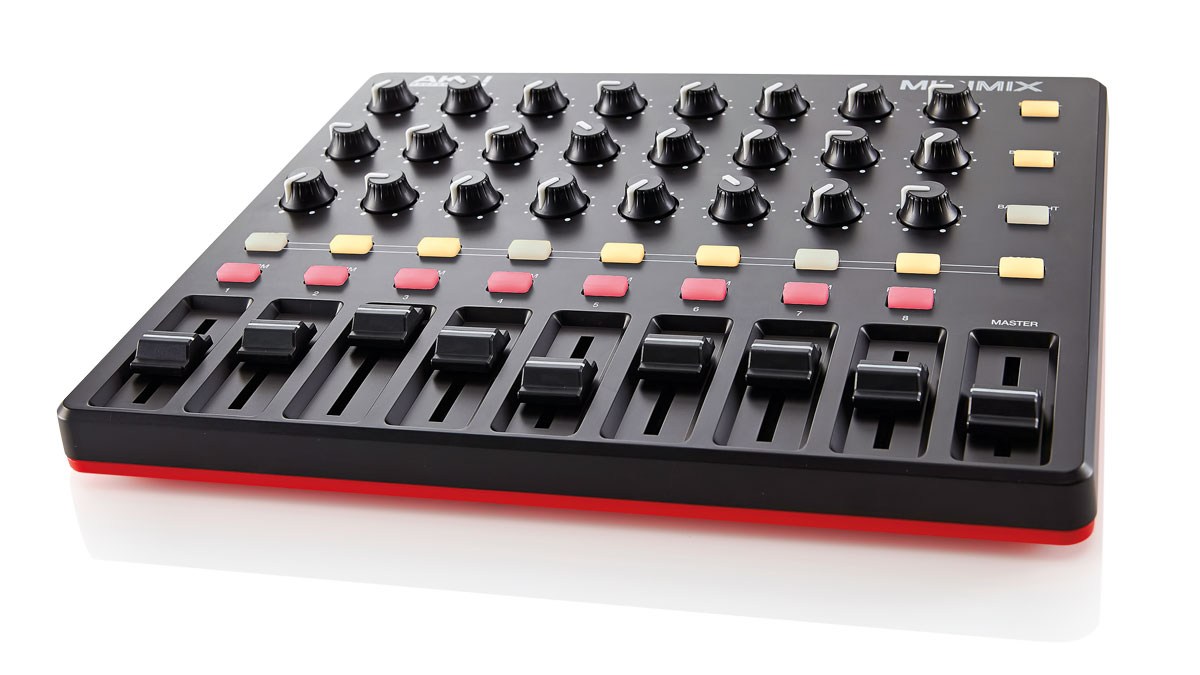MusicRadar Verdict
MIDImix is an incredibly affordable solution, especially considering the bundled Live software.
Pros
- +
This is a very affordable unit, and it even includes a copy of Ableton Live Lite. We need more mixer-type controllers - the more the better. The only thing better than a controller with 16 knobs is a controller with 24 knobs.
Cons
- -
Knobs are small and only rotate 270º.
MusicRadar's got your back
For a while we were so distracted by the flashing lights of pad-type controllers, that we neglected mixer interfaces. Recently, however, this oversight has been addressed by Novation's Launch Control XL and Livid Instruments' DS1. Now Akai enters the field with the MIDImix.
It's a simple enough proposition - nine faders, 24 knobs, and 16 buttons, connecting to the computer via USB. This isn't branded as an APC/Ableton device, perhaps because it's designed to be used with any and all MIDI software.
There are two reasons to be interested: one is the very low price of £59.99; the second is the mysterious Send All button, more of which later. Inside the box there's the MIDImix itself, a USB cable, a printed manual, and registration cards for the MIDImix and free copy of Ableton Live Lite.
"Once the MIDImix is selected in Preferences, you get instant control of track volume, pan, and effect sends"
The MIDImix has a footprint smaller than our 11-inch MacBook Air and is very lightweight; it's all plastic - you're getting what you pay for. The faders are short, and the knobs are unfortunately not the endless variety, with a range of 270º. They are also aggravatingly tiny - hmm, maybe this writer has big fingers. Set up with Ableton Live is simple.
Once the MIDImix is selected in Preferences, you get instant control of track volume, pan, and effect sends. The Bank buttons move left/right between blocks of eight tracks at a time, although there's no indication as to which tracks you're working on at any given time, and there's no way to navigate vertically through a Session View set.
By default the top row of knobs apply to Send A, the middle row Send B, and the lower row to Pan, while the buttons are assigned to handle track solo, record arm, and mute. Pair this with a Launchpad or other clip launcher hardware, and it adds the bare bones of mixer control.
As usual, you can put Live into MIDI Map Mode, and override these automatic assignments. There are no onboard presets, but a free editor for OS X and Windows lets you reassign different MIDI channels or messages to the hardware controls.
Using the MIDImix with Logic Pro X, or any other DAW, is just like with any other MIDI controller; you have to assign it manually, but then it works fine.
There's not much to say about what you see on the MIDImix - you can tell what it does by looking at it, which is the best way with mixers. But there is that Send All button - it transmits MIDImix fader and knob positions to the target DAW's corresponding controls.
This is an intriguing addition to the MIDImix's otherwise skimpy feature set. Even Akai themselves struggle to explain it, with vague talk of 'on-site' mixing, whatever that is. We tried it with Ableton Live, and it worked as advertised, but offhand we couldn't think of any application for it. We're sure there'll be a situation where it's going to be the most useful button ever, though!
If you're on an eye-wateringly tight budget, or you need a 'disposable' control surface to use in some kind of high-gear-risk situation, the MIDImix is for you. For around £119 you could opt for Novation's Launch Control XL, which is more focused on Ableton Live, and more solidly constructed, while again including Live Lite. Livid Instruments' DS1, for around £350, has many more controls, and aluminium construction.
However, it's hard to criticise the MIDImix at this price. If you want something old-school with simple knobs and faders, or you're hypnotised by the Send All button and you don't care about style, you should check it out.

Martin Delaney was one of the UK’s first Ableton Certified Trainers. He’s taught Ableton Live (and Logic Pro) to every type of student, ranging from school kids to psychiatric patients to DJs and composers. In 2004 he designed the Kenton Killamix Mini MIDI controller, which has been used by Underworld, Carl Craig, and others. He’s written four books and many magazine reviews, tutorials, and interviews, on the subject of music technology. Martin has his own ambient music project, and plays bass for The Witch Of Brussels.
“I called out to Mutt and said, ‘How about this?’... It was a complete fluke": How Def Leppard created a rock anthem - with a little bit of divine intervention
Baby Audio's Smooth Operator spectral balancing plugin goes pro
"It was ugly, like watching a divorce between four people. After a while, I had to get out": Beatles engineer Geoff Emerick on the recording of Abbey Road, track-by-track










